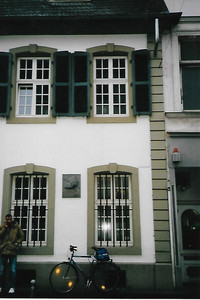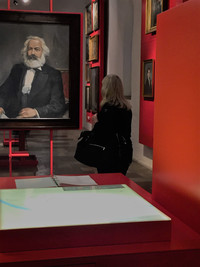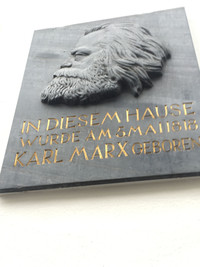By Carl H. Larsen
A towering figure in world affairs, he's the most famous son of a city that over the years has had conflicted views of just how to remember him. Refusing to be thrown into the dustbin of history, Karl Marx "is back," says one pamphlet in the city of his birth, Trier, Germany.
Indeed, this is a key year for sizing up anew the brilliant political theoretician who wrote "The Communist Manifesto" with Friedrich Engels in 1848 and "Das Kapital," his indictment of capitalism.
It's not so much revolutionary zeal that brings Marx to center stage once more. This is the bicentennial year of his birth on May 5, 1818, so a major observance of a man who changed history and whose disciples have brought misery to many parts of the world was deemed to be in order. This year Marx will be celebrated, discussed and reviled in many places around the globe. The anniversary has brought any number of conferences and many new books, as well as a movie, "The Young Karl Marx."
In Trier, memories of Marx are easy to find and will be supplemented by several new exhibitions. Just across the plaza from the tourist office stands the house where he grew up before going to college. A quick walk brings visitors and those making pilgrimages to the Karl Marx Haus, where he was born and which houses a museum about the man whose face, with its unkempt beard, is known around the globe.
The exhibitions should help visitors to Trier overcome the paradox of how Marx, one of nine siblings, could grow up in a comfortable middle-class family in the center of a seemingly prosperous city yet turn to a revolutionary career that would attract millions interested in his ideal of a classless society. "Workers of the world, unite" was his theme in preaching that capitalism would be overturned through a proletarian revolution of class struggle.
Starting on May 5, his birthday, the Marx birth house at Bruckenstrasse 10, operated by the Friedrich Ebert Foundation, will reopen after undergoing a major renovation and the installation of a new permanent exhibition. The exhibit promises to explore Marx's works and life and also how he became such a politically controversial figure who struggled with poverty at the end of his life. During the Nazi years in Germany the museum was taken over by the Nazi party and turned into a print shop.
Many other events related to Marx are planned this year in Trier — so many, in fact, that the local tourism office offers a discounted "Karl Marx Card" for $25 that will be available from May 5 to Oct.21, 2018, to see several exhibitions. Included are entry to the Marx birth house and its new exhibit; admission to the state museum exhibition, "Karl Marx (1818-1883): Life. Works. Times"; special exhibits at the Municipal Museum Simeonstift; and the Cathedral Museum.
"We didn't think we'd have much luck promoting this Marx theme to Americans," said a marketing manager for a Germany tourism organization. More inclined to make the journey, he said, were thousands of Chinese from mainland China, where the father of communism is held in adulation. Indeed, expecting busloads of visitors, local merchants have been practicing Chinese.
With all this recognition, Marx may be turning over in his grave in London's Highgate Cemetery. The building across from the tourist office where he lived as a young boy today houses a German version of a "dollar store" on the ground floor. And local capitalists, always looking for "a quick buck," are marketing Marx wine, which merchants must hope will be the people's choice in this important wine-producing region along the Moselle River.
The Trier tourist office has even planned several tours presenting Marx in his hometown. One is titled "How Wine Turned Karl Marx Communist." And that's not to mention bicentennial-year traffic signals with red and green lights displaying images of Marx.
Beyond Marx, Trier also presents other empire builders — the Romans. The city offers a grand look at life during the Roman Empire, when Trier was the Roman administrative center for northwest Europe.
Left today are 2,000-year-old architectural masterpieces that include a coliseum, the city's Porta Nigra (Black Gate), baths and a huge basilica dedicated to the Emperor Constantine. Many relics from the Roman period are on display at the state Landesmuseum.
Whether it's ancient Rome or Marx, one thing a visit to Trier will give you is an opportunity to be at the head of your class when talking politics and the fate of empires.
WHEN YOU GO
Trier is a three-hour train ride from the Frankfurt Airport and lies near the German border with Luxembourg. Along the way trains travel through the scenic Rhine and Moselle river valleys: www.bahn.com.
Inquire at the Trier Tourism Office about discounts for sightseeing and local transport, including the Trier Card and the Antikencard, focusing on the city's Roman attractions: www.trier-info.de/English/index.
Historic highlights of Germany: www.historicgermany.com
Trier Tourism Office Karl Marx site: www.trier-info.de/English/karl-marx.
Schroeders Appartement Hotel or Wein-Style Hotel: www.schroedershotels.com. The Wein-Style Hotel overlooks vineyards, and the Appartement Hotel is near the university, offering large apartment-style accommodation with kitchens and easy parking. Frequent city buses connect both with the Old Town, about a 15-minute ride.
Weinwirtschaft Friedrich-Wilhelm, focusing on German wines, is a pleasing restaurant near the city center with an outdoor terrace and tapas bar: www.weinwirtschaft-fw.de.
Weinstube Kesselstatt: www.weinstube-kesselstaff.de. Adjacent to the Cathedral, the restaurant specializes in regional selections and offers an outdoor terrace, indoor dining and a cavelike wine vault.
Zum Domstein: www.domstein.de/?lang=en. This city-center restaurant offers traditional German selections as well as a one-of-a-kind book-ahead dinner featuring dishes originating in the Roman Empire.



Carl H. Larsen is a freelance writer. To read features by other Creators Syndicate writers and cartoonists, visit the Creators Syndicate website at www.creators.com.
A portrait of Karl Marx hangs in the city museum in Trier, Germany. Photo courtesy of Carl H. Larsen.






View Comments